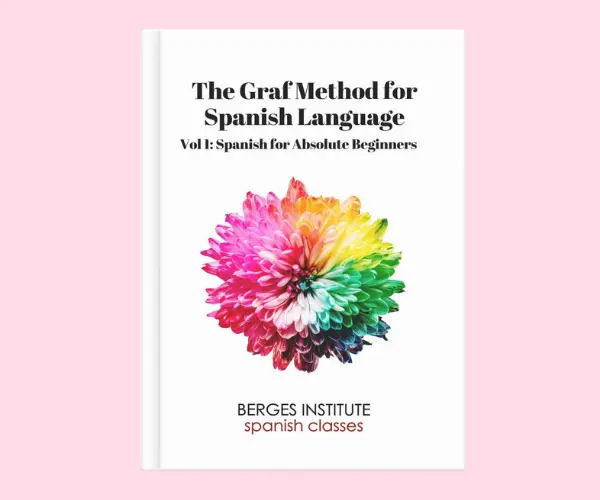


In this volume, we discuss the alphabet, definite and indefinite articles, and verbs ser and estar, among other topics.
Desgracia, suceso que produce dolor o pena. As you may glean from the cognates in this definition, desgracia means disgrace, an event causing pain or shame. It is a compound word that when taken apart can help us start delving into the nature of the word gracias.
Des-gracia, is the presence of pain or shame, and therefore we can imply that gracia is the opposite of these negative, unhappy feelings. There are fifteen entries for the word gracia in the RAE dictionary, all connected to happiness, beauty, pleasantness, positivity, wonder, benevolence, attractiveness, and joy in general.
We call someone gracioso when they are able to make us laugh, and we call someone agraciada when we find their physical characteristics pleasant to the eye. It is a word that has a religious origin, as grace was originally meant to come from God and conferred upon individuals for no apparent reason.
In some ways, gracia is an aethereal, hard-to-pin-down version of bueno. We know that we use bueno to talk about coffee, books, movies, and people, for example, and we often have parameters or word of mouth to attest to and confirm the quality of things like, say, the novel 2666, ramen at the restaurant Tonchin, or coffee in Italy.
Gracia, in some ways, is in the eye, or the heart of the beholder or the receiver. It was a word used to signify a bit of the divine in an interaction. Someone, by saying, doing, or sharing something with another, had caused to experience an inner joy, gracia.
The word has obviously evolved to something more mundane, a token we use to acknowledge others and the things they bring our way. The divine of the original grace has been replaced by the comforting and satisfying of everyday interactions. The word, however, remains pretty much the same, gracias.
Why the s at the end? Good question, and your correspondent will admit defeat. It is a given that these days most research starts at Google, not only because it’s convenient, but because it can also yield interesting information from trustworthy sources. Gracia and gracias, however, will send you down a path equal parts grammar and devotional videos and photos with no good prospects of figuring it out.
But there are other interesting facts to be found in related searches.
The Italian friar Thomas Aquinas described three levels of gratitude in his book Summa Teologica: recognition of the benefit received, praise for the person granting it, and a willingness to reciprocate.
The English thanks and the German danke both mean to think, implying that the person we are thanking for their words, deeds, or gifts is in our thoughts. This would be gratitude in the first level, recognizing the benefit.
When we express our gratitude with gracias, grazie, and merci we are wishing for our benefactor an equally gracious gift in return for what they bestowed upon us.
These days there’s a meme for pretty much everything. To whoever started the Yao Ming memes and runs the site that generates them, gracias. Let’s talk about “Que Dios se lo pague, porque yo no tengo plata” or “May God pay you back, because I’m broke.” Is the person conveying gratitude? Yes, but on a divine credit card, if you will.
More than mocking divine grace or religion, the point of sharing this meme, again, is to illustrate how grace and thankfulness have evolved from a religious concept to a mundane system of credit based on goodwill. In the absence of financial or physical means for repaying someone, gratitude will need to regain its divine nature.
In a curious turn of events, or words, the Portuguese bring their expressions of gratitude up a notch. There is no divinity involved in their thankfulness, but rather an expression of indebtedness, obrigado, which is more or less the same as the somewhat old-fashioned much obliged. The person expressing gratitude actually acknowledges a debt, an obligation.
Things get a bit more existential and philosophical in Japanese. We all are likely to have heard the words domo arigato in random contexts, from movies to songs to personal interactions. The blogger Kaki Okumura writes on the Medium platform and in an article there explains that the kanji for this expression is not as simple as a mere thank you.
This is what she writes about how the Japanese express thankfulness:
Arigato 有: To have, possess 難: Difficulty, hardship 有難う: Thank you good things in life are never obvious or a natural human right, but to be able to say thank you is actually a miracle in life.
We know then, that there is a substantial meaning and intention in the origin of gracias, but there are also other ways to express gratitude besides the aforementioned Dios se lo pague. Here are some:
Gracias is just one step in a chain of gestures that can make our interactions a bit warmer or kinder. Even when people are doing their job, or when they are doing something for us that doesn’t require substantial effort, or when they are sharing something that is of minimal value, there is always the fact that they have shared or provided something that was needed. The chain starts with por favor, per favore, s’il vous plait, si us plau (Catalan), and please, which is the pared-down remainder of if it pleases you. As you can see, French, Catalan, and English share exactly the same formula for requesting favors, while Italian, Portuguese, and Spanish share basically the same combination of por and favor.
Favor both in English and Spanish conveys a preference or benefit. Ese color te favorece can be roughly translated to That color suits you. So asking for something por favor may have originally meant that the person was requesting a concession or a benefit. With time the expression has lost some of this power to request, as it sometimes is a mere gesture that accompanies a request that is meant to be fulfilled without the need to grant benefits or favors. Think of the person who says, Quiero los tacos de vegetales, por favor. There is no magnanimity in the person taking the order and later on delivering the food, but the small phrase remains as a reminder of the humanity of the parties involved.
Finally, we have the reply to gracias, which is traditionally de nada, meaning there is nothing to be thankful for. Other answers may include:
The late Gustavo Cerati, known as a talented singer-songwriter as well as a great musician and performer got his start as the lead singer of Soda Stereo, an Argentinian band that provided a worthy counterweight in Spanish to rock bands from the UK and USA. In their last concert, as an era is drawing to an end, Cerati thanks the band’s audience and collaborators with an emphatic ¡Gracias. Totales! And we would also like to thank you for reading all the way to the end: Gracias, Chido, Dios se lo pague, Grazie, Obrigado, Gracies, Merci.

Alejandro Navarro is a former Spanish language instructor at Berges Institute.
